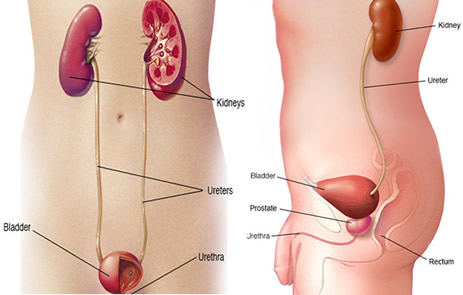Can Colon Cancer Affect the Bladder?
At advanced stages, colon cancer can spread and affect other organs. The cancerous cells can break away from the primary tumor and travel through bloodstream and lymphatic system. Bladder itself is not too far from bowel. Does it mean that colon cancer can affect the bladder, too?
Bladder is important organ, a muscular sac in your pelvis, to help temporarily store urine, allowing your urination to be infrequent & voluntary. It has normal capacity of about 400 – 600 ml. And when empty, it is about the shape and size of a pear.
The body starts producing urine in the kidneys. Then urine travels down to the bladder through tubes called ureters (two tubes). And in the bladder, urine is temporarily stored, as noted before. When it is full or almost full, you will have an urge to urinate.
During urination, the muscles in the bladder contract and the valves (sphincters) open to push and allow urine flow out! Then urethra (one tube) carries urine out of the body when you pee (see the picture below, credit to Mayo). Urethra is shorter in women (1.5 inches) than in men (8 inches).
If there something goes awry with your bladder, it can affect the way of your body in passing urine. And it can be affected by cancer, too – either primary bladder cancer (cancer that originally start and grow in the bladder) or secondary bladder cancer (cancer started elsewhere in the body that spreads to the bladder).
Bladder cancer is quite common. It is 5th most commonly diagnosed malignancy. The good news, it is often diagnosed at early stage, when the disease is mostly likely to be treated and cured.
Many times, it occurs from cells that line the inside of bladder. And like colon cancer, it is also commonly found in older adults, though it can affect people of all ages.
In rare cases, colon cancer can spread to the bladder
Most cases of bladder cancer are associated with lifestyle and environmental factors, especially such as exposure to harmful substances for many years. Cigarette smoking is one of common causes. Even almost 50 percent of all cases are linked to smoking.
There are some cancers that have started elsewhere in the body and spread to the bladder, causing secondary bladder cancer. These include cancers of prostate, colon, rectum, ovaries, uterus (womb), cervix, breast, and lungs.
Secondary bladder cancer is quite rare. Having it doesn’t mean you have bladder cancer (primary bladder cancer) since the cancer cells come from outside the bladder. The treatment for primary and secondary bladder cancers is also different.
Colorectal cancers (including cancers of colon and rectum, both are also familiar called as bowel cancers) can spread to the bladder, too (in less common cases). But if compared to rectal cancer, colon cancer may be less likely to spread to the bladder.
Mostly, if they have spread to other distinct organs, they tend to spread to liver and lungs. In fact, liver and lungs are the first and second common places for metastatic bowel cancer to spread. For in-depth information about where bowel cancer spreads to in the body, see this article!
Colon cancer can affect bladder indirectly!
But even though if the primary cancer in the colon doesn’t spread to the bladder, there is still a chance for it to affect bladder.





Brother diagnosed with bowel cancer which has attached itself to the bladder. Necessating some bladder resection.
My concern is …….has the tumour just attached itself to the bladder or could this be something else.
It’s hard to answer without tests. Several tests are usually necessary to determine whether it’s primary or secondary cancer.